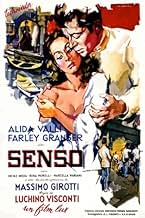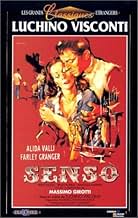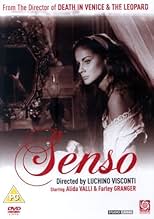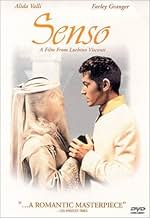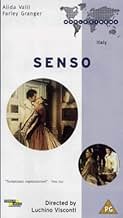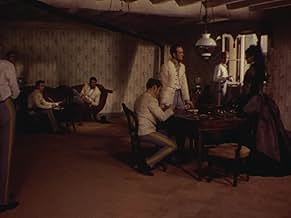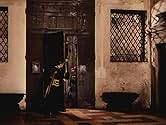IMDb-BEWERTUNG
7,4/10
9612
IHRE BEWERTUNG
Eine sorgenvolle und neurotische italienische Contessa betrügt ihr ganzes Land für eine selbstzerstörerische Liebesaffäre mit einem österreichischen Leutnant.Eine sorgenvolle und neurotische italienische Contessa betrügt ihr ganzes Land für eine selbstzerstörerische Liebesaffäre mit einem österreichischen Leutnant.Eine sorgenvolle und neurotische italienische Contessa betrügt ihr ganzes Land für eine selbstzerstörerische Liebesaffäre mit einem österreichischen Leutnant.
- Auszeichnungen
- 3 Gewinne & 2 Nominierungen insgesamt
Franco Arcalli
- Un soldato
- (Nicht genannt)
Aldo Bajocchi
- Un soldato
- (Nicht genannt)
Ottone Candiani
- Un soldato
- (Nicht genannt)
Nando Cicero
- Un soldato
- (Nicht genannt)
Claudio Coppetti
- Un soldato
- (Nicht genannt)
Cristoforo De Hartungen
- Il generale Hauptmann
- (Nicht genannt)
Tony Di Mitri
- Un soldato
- (Nicht genannt)
Empfohlene Bewertungen
Senso was Visconti at his most elegant and aesthetic. It opened his series of historical spectacles. The film showed that epics and melodramas can entail political criticism as any other genres. Senso is his intelligent analysis about the Italian unification - Risorgimento. The film's criticism didn't please all the people and it suffered from censorship and it was edited several times. Nonetheless this aesthetically beautiful film still stands out as a fine ironic masterpiece.
The year is 1866 and the moment people have dreamed for decades - centuries - is in our hands. Garibaldi is coming and the Italians are beating the Austrians. In the middle of all this Visconti tells us a story about an Italian woman, who is the cousin of the leader of the underground resistance, who falls in love with an Austrian lieutenant. She is blinded by her romantic illusion and is ready to betray her family, friends, ideals and native land - these are part of the ethical problematics in Senso.
Senso was Visconti's first color film and he obviously had put a lot of effort to it. It's visually gorgeous and meant an aesthetic revolution for Italian cinema. It is no coincidence that it starts in an opera which Visconti did a lot himself too. The opening sequence shows us the basic power of Opera and melodrama - to change life, infrastructure without forgetting the concrete history.
Historical films always tell us about two different ages, intentionally or unintentionally: the one the story takes place in and the time it was made in. It's a film about the Italian unification but also a study about the deepest emotions in Italy during the 1950's. Italy after WWII, filled with neo realism - antifascist battle and hope for democracy. But also about the downside; the victory of the right-wingers and the beginning of the Cold War.
Senso is a gorgeous film which requires patience and love from its viewer. It's a political, ironic, revolutionary and aesthetic film. Truly one of the biggest landmarks in Visconti's career but also in the history of Italian cinema.
The year is 1866 and the moment people have dreamed for decades - centuries - is in our hands. Garibaldi is coming and the Italians are beating the Austrians. In the middle of all this Visconti tells us a story about an Italian woman, who is the cousin of the leader of the underground resistance, who falls in love with an Austrian lieutenant. She is blinded by her romantic illusion and is ready to betray her family, friends, ideals and native land - these are part of the ethical problematics in Senso.
Senso was Visconti's first color film and he obviously had put a lot of effort to it. It's visually gorgeous and meant an aesthetic revolution for Italian cinema. It is no coincidence that it starts in an opera which Visconti did a lot himself too. The opening sequence shows us the basic power of Opera and melodrama - to change life, infrastructure without forgetting the concrete history.
Historical films always tell us about two different ages, intentionally or unintentionally: the one the story takes place in and the time it was made in. It's a film about the Italian unification but also a study about the deepest emotions in Italy during the 1950's. Italy after WWII, filled with neo realism - antifascist battle and hope for democracy. But also about the downside; the victory of the right-wingers and the beginning of the Cold War.
Senso is a gorgeous film which requires patience and love from its viewer. It's a political, ironic, revolutionary and aesthetic film. Truly one of the biggest landmarks in Visconti's career but also in the history of Italian cinema.
It's no coincidence that the film opens at the opera. In some fine deep shots we are introduced to our characters with the performance in the background - no doubt to establish the stylistic connection. So Visconti, and collaborator Franco Zefferelli, wanted to make an opera without the singing. This gives us grandeur, but rigidity, and even the mini riot that takes place in the opera house at the outset is aesthetically stylised. You need to buy into the approach at this point, and I simply didn't. It just seemed like a bad idea. Opera is a stage spectacle, all about grand gesture, posturing, formality; it cannot transmit subtleties, the format doesn't allow it. Take away the music and you are left with a banal story and a lot of fancy costumery. For Visconti, constantly wanting to remind us of his noble descent, that is enough - his main concern is showing us lavish interior decor, an obsession you'll find either stirring or stifling. For music we get Bruckner, whose indecisive, meandering drone is largely ignorable.
Cinematically, the result is half-baked. Valli walks into a room full of Austrian soldiers. David Lean (who I equate with Visconti to some extent) would have made a significant scene out of this but Visconti just gives us soldiers draped around the place in various unnatural postures, as you might expect. One of them moves and strikes up a different posture as you might expect. It's all cut and pasted from the Manual of Things Seen and Done Before. The camera stays back, wide angle, and doesn't lend much of a hand with the narrative, leaving the players to communicate with exaggerated gesture.
A married Venetian countess falls for a young Austrian army officer - we know from the first scene that he is an utter cad, but she doesn't or rather she does, but being a one dimensional clinging woman she is bound to hurl herself into disastrous folly. Hence the film mainly consists of Valli ringing the emotional changes over her illicit affair. Visconti indulged so much time in this that he must have thought he was dealing with an original topic. Along the way, there's the approaching end of Austrian rule of northern Italy and some slight comment on the collaboration of senior Venetian figures but that point seems hardly worth making after all this time. There is a lengthy section where Valli's cousin (dashing hero figure) rushes on a military errand rather ridiculously right across the battle line of two approaching armies, but this section was apparently heavily edited, rendering it pointless and incomprehensible. The battle scenes are childish a puff of smoke and the nearest two soldiers fall to the ground this happens repeatedly.
The script can't do anything with the stereotypical characters and the one-sentence plot and there are no stand-out lines. This is extraordinary considering the 'English dialogue by Tennessee Williams and Paul Bowles'. Probably it was there but smothered by Visconti's operatic technique. One wonders why these writers were attracted to the project (apart from a free holiday in Rome) perhaps they liked the final humiliation of the countess, which is quite harsh even gleefully misogynistic. She gets her own back though, and it seems the moral is that both men and woman, with their impulsive need for each other, no matter how noble the exterior, are stupid, weak and mutually self-destructive. That ridicules everybody (...or does it?).
Funnily enough, the main problem is Alida Valli, who is required to over-emote in every scene (in total contrast to her depressive role in "The Third Man") it's a little unpleasant to watch and she soon begins to annoy. She doesn't look right at all during the romance too hard-edged. Farley Granger was actually the main point of interest. His slight woodenness suits the impossibly white uniform and cape he was made to wear (what sort of wash-powder did they have in those days?), and in the climactic drunken scene (enhanced by a delightful whore - the highlight of the film) he did as well as anyone could have done under a direction that demanded over-amplification of every attempted nuance. And his eyes expressed something beyond the paltry plot of the film as if betraying that this Italian job was an odd, intense experience for him for one reason or another. So, for all the film's grandeur, all I was left with was some vague speculation of a personal nature about one of its players. Perhaps his story relating to the real world - is the film Visconti should have made.
Cinematically, the result is half-baked. Valli walks into a room full of Austrian soldiers. David Lean (who I equate with Visconti to some extent) would have made a significant scene out of this but Visconti just gives us soldiers draped around the place in various unnatural postures, as you might expect. One of them moves and strikes up a different posture as you might expect. It's all cut and pasted from the Manual of Things Seen and Done Before. The camera stays back, wide angle, and doesn't lend much of a hand with the narrative, leaving the players to communicate with exaggerated gesture.
A married Venetian countess falls for a young Austrian army officer - we know from the first scene that he is an utter cad, but she doesn't or rather she does, but being a one dimensional clinging woman she is bound to hurl herself into disastrous folly. Hence the film mainly consists of Valli ringing the emotional changes over her illicit affair. Visconti indulged so much time in this that he must have thought he was dealing with an original topic. Along the way, there's the approaching end of Austrian rule of northern Italy and some slight comment on the collaboration of senior Venetian figures but that point seems hardly worth making after all this time. There is a lengthy section where Valli's cousin (dashing hero figure) rushes on a military errand rather ridiculously right across the battle line of two approaching armies, but this section was apparently heavily edited, rendering it pointless and incomprehensible. The battle scenes are childish a puff of smoke and the nearest two soldiers fall to the ground this happens repeatedly.
The script can't do anything with the stereotypical characters and the one-sentence plot and there are no stand-out lines. This is extraordinary considering the 'English dialogue by Tennessee Williams and Paul Bowles'. Probably it was there but smothered by Visconti's operatic technique. One wonders why these writers were attracted to the project (apart from a free holiday in Rome) perhaps they liked the final humiliation of the countess, which is quite harsh even gleefully misogynistic. She gets her own back though, and it seems the moral is that both men and woman, with their impulsive need for each other, no matter how noble the exterior, are stupid, weak and mutually self-destructive. That ridicules everybody (...or does it?).
Funnily enough, the main problem is Alida Valli, who is required to over-emote in every scene (in total contrast to her depressive role in "The Third Man") it's a little unpleasant to watch and she soon begins to annoy. She doesn't look right at all during the romance too hard-edged. Farley Granger was actually the main point of interest. His slight woodenness suits the impossibly white uniform and cape he was made to wear (what sort of wash-powder did they have in those days?), and in the climactic drunken scene (enhanced by a delightful whore - the highlight of the film) he did as well as anyone could have done under a direction that demanded over-amplification of every attempted nuance. And his eyes expressed something beyond the paltry plot of the film as if betraying that this Italian job was an odd, intense experience for him for one reason or another. So, for all the film's grandeur, all I was left with was some vague speculation of a personal nature about one of its players. Perhaps his story relating to the real world - is the film Visconti should have made.
Wonderful movie, and quite unexpected at the time from the neorealist Visconti, finally letting some of the operatic juice flow into his film work. It's also the first of his explorations of Italian history and social change, to be followed by The Leopard and the fantastic Rocco and His Brothers.
One caveat: At a screening a couple of years ago at MoMA, I learned that it was the Italian government that was responsible for the snipping of some crucial scenes near the end of Senso, depicting the Battle of Custozza. These were meant to make his critique of the Italian ruling classes and their failure to pull together during this period of the risorgimento more explicit. But apparently the Italian government, fresh from defeat in WW II, didn't like the idea of a major movie showing an Italian army being beaten. So the episode was truncated, leaving a few people scratching their heads about what the point of it all was. Poor Visconti tended to make long movies, and often had trouble getting them shown at the proper length in the US, but this time it was his own government that stymied him!
As for the rest: Granger is fine, but it's Valli who gives one of the all-time great move star performances. What a great face! The story is written on it, and the director wisely keeps her the focus of attention.
One caveat: At a screening a couple of years ago at MoMA, I learned that it was the Italian government that was responsible for the snipping of some crucial scenes near the end of Senso, depicting the Battle of Custozza. These were meant to make his critique of the Italian ruling classes and their failure to pull together during this period of the risorgimento more explicit. But apparently the Italian government, fresh from defeat in WW II, didn't like the idea of a major movie showing an Italian army being beaten. So the episode was truncated, leaving a few people scratching their heads about what the point of it all was. Poor Visconti tended to make long movies, and often had trouble getting them shown at the proper length in the US, but this time it was his own government that stymied him!
As for the rest: Granger is fine, but it's Valli who gives one of the all-time great move star performances. What a great face! The story is written on it, and the director wisely keeps her the focus of attention.
This has to be one of my all time old favorite Romantic Motion Picture.
Visconti brings about Magic and beauty onscreen making every shot a glamour in experience!
There are so many great moments in Senso that it will take you ages before this Picture wears out in your memory.
Besides the fact that Visconti is one of the great Film-makers of all times it has to be said that this Director simply had a feel about shots to form a scene to imprint that exact emotion or feeling that was intended by him. He always knew to capture and captivate the viewer and bring about that special bond which nowadays we have lost with contemporary Motion Pictures!
For all out there whom enjoy the Art of Film-making, for all whom cherish good Film-making, go fetch "Senso"! It's an experience not to forget!
Senso is about the magic which comes about when a Picture finds it's way through the Projector unto the White screen! It's an experience rarely seen but so is this Art which is only understood by a handful of Film-makers!
Luchino Visconti, I thank you for this venture and understanding of the greatest Art form in this Universe!
Visconti brings about Magic and beauty onscreen making every shot a glamour in experience!
There are so many great moments in Senso that it will take you ages before this Picture wears out in your memory.
Besides the fact that Visconti is one of the great Film-makers of all times it has to be said that this Director simply had a feel about shots to form a scene to imprint that exact emotion or feeling that was intended by him. He always knew to capture and captivate the viewer and bring about that special bond which nowadays we have lost with contemporary Motion Pictures!
For all out there whom enjoy the Art of Film-making, for all whom cherish good Film-making, go fetch "Senso"! It's an experience not to forget!
Senso is about the magic which comes about when a Picture finds it's way through the Projector unto the White screen! It's an experience rarely seen but so is this Art which is only understood by a handful of Film-makers!
Luchino Visconti, I thank you for this venture and understanding of the greatest Art form in this Universe!
Whatever Anton Bruckner had in mind when writing his majestic Seventh Symphony, it probably wasn't as the score to a postwar Italian love story set during the Italian-Austrian conflicts of the Risorgiamento. Though the use of pre-existing classical music as backdrop for films is to be discouraged, here it works in surprising ways. Alida Valli is the Countess Livia Serpieri, in a loveless marriage to an older, collaborationist official. At the opera (Venice's La Fenice during Il Trovatore!) she meets up with a dashing young Austrian officer, Farley Granger. (Digression: After a handful of American films -- They Live by Night, Rope, Side Street, Strangers on a Train -- Granger journeyed to Italy to work with Visconti then fell off the screen for years, only to resurface in a few schlock films in the late 60s and early 70s. What happened to him?) They kindle up a clandestine and dangerous affair -- the wealthy older woman and the manipulative wastrel. After wheedling a small fortune out of her to bribe a doctor who declares him unfit to serve, he dumps her. But hell hath no fury....Luchino Visconti, assisted by the young Franco Zeffirelli -- both were opera directors, too -- pulls out all the stops, ending with a finale reminiscent of Tosca (but with a twist). Senso is a shameless and unforgettable wallow in Italianate passion -- unabashed verismo translated to the silver screen.
Wusstest du schon
- WissenswertesThe film opens in La Fenice, the Venice opera house. La Fenice was destroyed by arson in 1996, but reopened in 2003. Enlarged frames of this movie were used as a reference in reconstructing it.
- Zitate
Il tenente Franz Mahler: It's too late! It's over! I'm not your romantic hero!
- Alternative VersionenTwo versions of the film are available on video.
- One version is missing the scene where Livia tries to explain where all the money meant for the troops went.
- Another version is missing the climatic battle sequence between the Austrian and Italian troops.
- VerbindungenEdited into Geschichte(n) des Kinos: La monnaie de l'absolu (1999)
- SoundtracksSinfonia N. 7 in mi maggiore (7th Symphony)
Music by Anton Bruckner
Performed by Orchestra Sinfonica Nazionale della Rai
Conducted by Franco Ferrara
Top-Auswahl
Melde dich zum Bewerten an und greife auf die Watchlist für personalisierte Empfehlungen zu.
- How long is Senso?Powered by Alexa
Details
Box Office
- Budget
- 700.000.000 ITL (geschätzt)
- Bruttoertrag in den USA und Kanada
- 27.723 $
- Eröffnungswochenende in den USA und in Kanada
- 3.984 $
- 28. Okt. 2018
- Weltweiter Bruttoertrag
- 27.723 $
- Laufzeit
- 2 Std. 3 Min.(123 min)
- Farbe
Zu dieser Seite beitragen
Bearbeitung vorschlagen oder fehlenden Inhalt hinzufügen

![Trailer originale italiano [OV] ansehen](https://m.media-amazon.com/images/M/MV5BYzc0Y2MyOGMtMzg0My00Mzc4LWIwYjItZjg1ZDhmMDZmOTlkXkEyXkFqcGdeQXRodW1ibmFpbC1pbml0aWFsaXplcg@@._V1_QL75_UX500_CR0)

